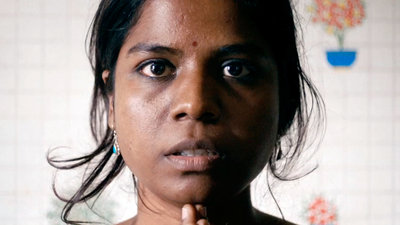
War is hell, no doubt. But for all those nameless, faceless refugees escaping the war at home, the realities of relocation can plunge them into a new kind of nightmare, one almost as bloody and chaotic.
In Jacques Audiard’s latest film, Dheepan, a trio of refugees fleeing war-torn Sri Lanka wind up in a French slum, where they are forced, literally, to fight for their lives. At once excruciatingly suspenseful and tenderly intimate, this film — which won the 2015 Palme d’Or at Cannes — takes a geopolitical crisis and humanizes it in ways that are revealing and moving.
The film opens on a scene of brutal devastation: Dheepan (Antonythasan Jesuthasan), a vanquished insurgent, lays palm fronds over the bodies of fallen soldiers, who are then burned wholesale. Along with other Tamil Tigers, Dheepan is forced into a refugee camp, where he forms a quick alliance with Yalini (Kalieaswari Srinivasan), a woman who, to gain asylum, poses as the mother of Illayaal (Claudine Vinasithamby), a 9-year-old orphan. Together, these three strangers form a makeshift family, eventually landing in Le Pré-Saint-Gervais, a kind of Cabrini Green-style housing project north of Paris.
Dheepan, a tragic man whose quiet dignity belies the surging agonies of PTSD, is made caretaker of the housing project, which doubles as a haven for thugs and drug runners. Illayaal enters school, and Yalini reluctantly takes on the role of wife and mother, though she’s torn by a constant urge to leave this new hellhole for London. Eventually, their lives tangle up with Brahim (Vincent Rottiers), a recently released convict desperate to re-establish his kingpin control over the projects.
Dheepan moves with tense, relentless momentum toward an explosive conclusion that is no less shocking for being inevitable. And yet, for all its implied and explicit violence, the film finds the real source of its power in the transformation of a ramshackle immigrant family whose survival gives rise to something that looks a lot like love.
Audiard has a beautiful eye for the telling details of immigrant life (which, after all, is just life). At one point, Dheepan confesses to Yalini that he completely fails to understand French humor, and as she ribs him about this, we witness a kind of thaw — the warmth of two strangers finding a common humanity, which leads to an erotic recognition that is inseparable from their growing sense of place. Moments such as these make Dheepan a special movie, indeed; the undeniable politics of the situation, so complex and heartless, are nonetheless subsumed to serve the universal drama of human beings searching for identity amid the mess of everyday life, no matter how shitty that is.
And that, really, is why Dheepan is such an important film right now. As the vicious clamor of pampered politicians and xenophobic reactionaries rises to a din that threatens to drown out all reason, this film puts truth to the lie that hordes of invading foreigners are the problem, and that the threat to society always comes from without. It’s a cold, cowardly heart that would take a look at a man like Dheepan and call him the real enemy. (Broadway Metro)